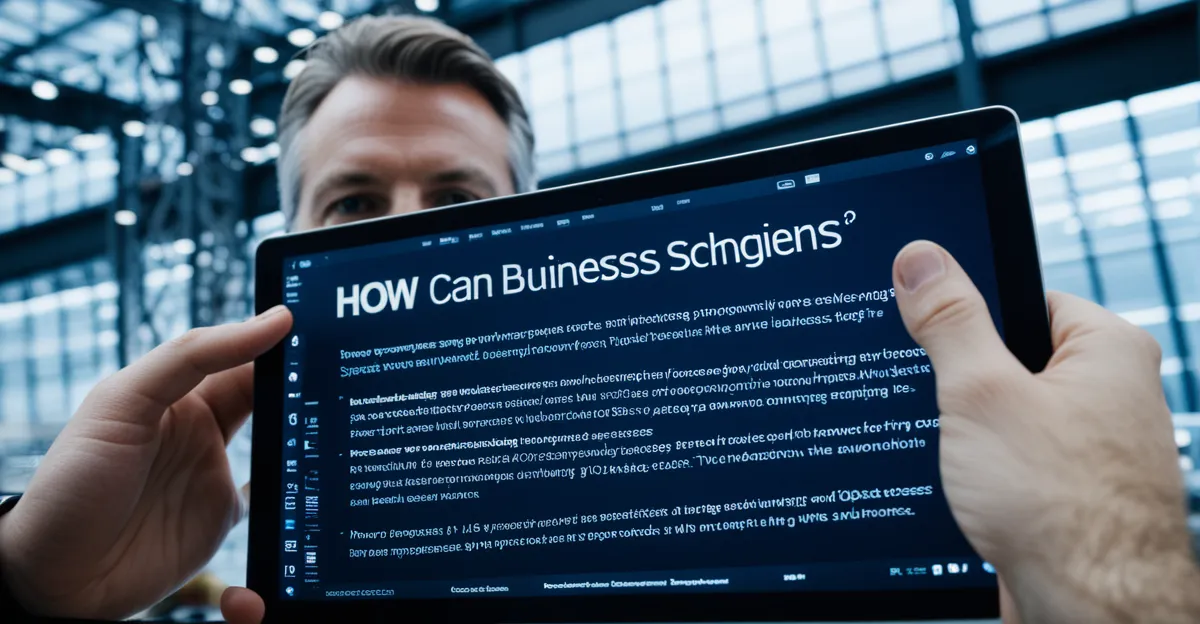Overview of Emerging Technologies in Business
The integration of emerging technologies is reshaping the UK business landscape, offering transformative solutions across various sectors. These innovations are pivotal for businesses seeking to stay competitive and efficient.
Emerging technologies such as AI, IoT, and blockchain are particularly impactful. Artificial Intelligence enhances business processes through automation and personalized customer service, leading to greater efficiency and customer satisfaction. IoT technology, with its smart devices and advanced data connectivity, facilitates real-time monitoring and improved operational efficiency in industries like manufacturing and logistics. Blockchain, known for its decentralised solutions, offers robust data security and transparency, making it indispensable for industries like finance and supply chain management.
Also read : What are the opportunities for UK tech in the global market?
Current trends indicate a rapid technology adoption rate among UK businesses, driven by the need to innovate and remain competitive on a global scale. Companies are increasingly investing in these technologies to harness data, streamline operations, and secure sensitive information. Understanding these trends and technologies is crucial for businesses aiming to leverage cutting-edge solutions and maintain a competitive edge.
Artificial Intelligence Adoption
Artificial intelligence is increasingly becoming a cornerstone for business automation in the UK. It is transforming traditional business processes by enabling machines to perform tasks that previously required human intervention.
Additional reading : What are the key factors shaping the future of UK technology?
Benefits of AI for UK Businesses
AI implementation provides numerous advantages, including enhanced efficiency and personalization. Through its ability to analyze large datasets, AI facilitates improved decision-making processes and delivers tailored customer experiences. For instance, retail businesses use AI to recommend products based on customer preferences, leading to increased satisfaction and sales. Additionally, AI-powered automation reduces operational costs by streamlining repetitive tasks.
Case Studies of Successful AI Integration
Various UK companies have successfully integrated AI into their operations, demonstrating its potential. A notable example is a UK-based retail chain that adopted AI to revamp its supply chain management. By utilizing real-time data analytics, they achieved a 20% reduction in logistics costs and improved stock management. In the finance sector, AI-driven fraud detection systems have been pivotal in safeguarding customer transactions, showcasing AI’s versatility across different industries.
Challenges and Solutions in AI Adoption
Despite its advantages, AI adoption presents several challenges, such as data privacy concerns and the need for workforce reskilling. To address these, companies are implementing stringent data protection measures and investing in training programs that equip employees with the skills needed to work alongside AI technologies. Ensuring transparency in data usage and fostering a culture of continuous learning are critical strategies for overcoming these hurdles.
Internet of Things (IoT) Applications
The rise of IoT technology is ushering in transformative changes across the UK business landscape, marking a leap in real-time data collection and monitoring capabilities.
Enhancing Operational Efficiency with IoT
IoT enables industries to leverage smart devices for seamless data connectivity. This advancement fosters enhanced operational efficiency, particularly in manufacturing and logistics sectors. Businesses can now track inventory with unprecedented accuracy and anticipate maintenance needs through predictive analytics. This adaptability not only mitigates potential downtime but also optimizes resource allocation, ensuring peak operational performance.
Real-World Examples of IoT Use in UK Industries
Numerous UK sectors exemplify the effective deployment of IoT technologies. In manufacturing, IoT systems facilitate machine-to-machine communication, streamlining production processes. For instance, logistics companies employ IoT to optimize delivery routes and monitor vehicle conditions in real-time, ensuring timely and efficient operations. Such applications underscore the technology’s pivotal role in improving industry standards and customer satisfaction.
Future Potential of IoT in Business
As IoT continues to evolve, its potential expanses into greater customization and integration capabilities. Future advancements are expected to bring forth more robust data analytics, empowering businesses with deeper insights and automation. Long-term, IoT is poised to redefine traditional business models, advocating for smarter, more interconnected systems that drive sustainable growth. This trajectory hints at a promising frontier, urging companies to adopt IoT solutions proactively to remain competitive.
Blockchain Technology in Business
The advent of blockchain technology is revolutionising the UK business landscape, offering decentralised solutions and heightened data security. This section explores the various ways blockchain is transforming business operations, highlighting both successful implementations and the challenges faced.
Advantages of Blockchain for Business Operations
One of the key advantages of blockchain technology is its ability to provide unparalleled transparency and security. This is mainly due to its decentralised nature, which ensures that data is immutable once recorded on the blockchain. This feature drastically reduces the risk of fraud and enhances trust among stakeholders, making it a highly valuable asset for sectors such as finance and supply chain management. For instance, in the finance sector, blockchain facilitates secure and verifiable transactions, while in supply chains, it ensures traceability and transparency of goods.
Successful Blockchain Implementations in the UK
The UK has witnessed several successful blockchain implementations across different industries. A prominent example can be seen in the finance sector, where blockchain is used to create efficient and secure platforms for digital transactions. Additionally, UK-based logistics companies have successfully integrated blockchain solutions to track shipments and improve supply chain visibility, resulting in reduced operational costs and enhanced consumer trust.
Challenges in Blockchain Technology Adoption
Despite its potential, the adoption of blockchain technology does not come without challenges. One of the main barriers is the complex regulatory landscape, which can hinder widespread implementation. Moreover, there is a need for businesses to invest in both technology and workforce training to ensure a smooth transition to blockchain-based systems. Addressing these hurdles is essential for companies looking to fully realise the benefits of blockchain technology.
In conclusion, blockchain holds immense potential for transforming business operations, but achieving this requires careful consideration of its advantages and challenges in the current regulatory environment.
Best Practices for Implementing Emerging Technologies
Navigating the landscape of emerging technologies requires strategic planning and execution for UK businesses aiming to harness innovation effectively. A successful technology adoption strategy involves several key steps. Firstly, conducting a comprehensive analysis of current business operations is crucial to identify potential areas where technology can offer the most benefit. This assessment helps prioritize investments in technologies like AI, IoT, and blockchain, aligning them with business goals.
Training and reskilling employees is another critical component. Implementing new technologies often demands a shift in the workforce’s skillset. Providing targeted training programs ensures employees are equipped to leverage new tools effectively, which can help mitigate resistance to change and facilitate smoother transitions.
Measuring the impact and ROI of technology investments is essential for maintaining competitive advantage. Businesses should establish clear metrics and benchmarks from the outset to evaluate performance improvements and cost efficiencies. Regular reviews and adjustments ensure the technology continues to meet evolving business needs.
Overall, implementing emerging technologies requires a combination of strategic foresight, employee empowerment, and continuous evaluation to drive innovation and business growth.
Resources for Further Learning
As businesses navigate the intricate world of emerging technologies, accessing the right resources becomes vital for understanding and implementing these advancements effectively. The fast-paced nature of the technology sector makes it crucial to stay informed and connected.
Recommended Online Learning Platforms
Online learning platforms offer a plethora of educational materials that cater to the needs of professionals seeking to upskill. Websites such as Coursera and Udemy provide comprehensive courses on AI and blockchain, allowing learners to explore these technologies in depth. These platforms often feature courses led by industry experts, ensuring valuable insights and practical knowledge.
Industry Conferences and Networking Opportunities
Attending industry conferences provides exposure to cutting-edge developments and offers networking opportunities with fellow professionals. Events like the UK Technology Summit present forums for exchanging ideas and discussing the latest trends in IoT technology or business automation. Such gatherings are instrumental for businesses keen on keeping pace with innovation trends.
Expert Opinions and Insights
Gaining insights from industry thought leaders adds significant value to one’s understanding of technological advancements. Resources such as journals, blogs, and panels featuring expert opinions on technology adoption and strategic implementation can guide decision-makers in developing effective innovation strategies. Engaging with these insights facilitates better planning and adaptation to the rapidly changing tech landscape.











